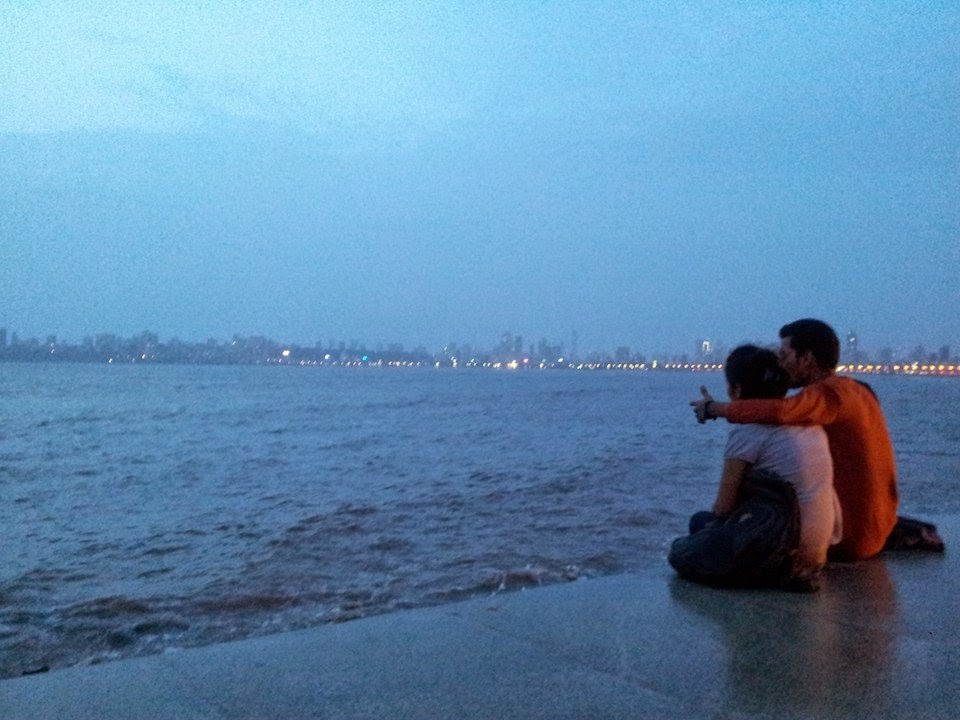“Silently, one by one, in the infinite meadows of heaven,
Blossomed the lovely stars, the forget-me-nots of the angels.”
― Henry Wadsworth Longfellow
Loneliness brings back memory of good old days, amplify it manifolds and then make you crave for them. It is almost like re-living those times- good or bad. I had one such moment the other night. For lack of anything better to do, I was gazing out of the window of my bedroom late in the night. The Arabian sea outside was pitch black and except for few pale streetlamps there was hardly any light. My eyes followed the tall towers nearby and then fell on the sky. Like other metros of India, Mumbai sky is usually full of smog and even in daytime you do not see that brilliant colour of blue in the sky which one finds up in the hills or in some parts of Europe. Not many stars were visible but just one look at the star and a flood of memories broke loose in my mind.
Like many other traits
(viz. Love for gardening, food, poetry, mathematics), I got interested in stars
thanks to my father. My father, who was a student of mathematics himself,
introduced me to both astronomy and astrology and taught me how to calculate planetary
positions. In those pre-internet days,
it was the monthly sky chart of The Hindu newspaper which generally guided my
amateur spotting of constellations and stars. By no means, I was a great shot in
doing this but I can still recall the thrill. Some like Ursa Major and Orian
were easy to spot but some others took me hours to locate and identify...but when finally I was able
to spot them, even the aching neck and scolding
of my mom for being in garden late in the night, looked trivial against the excitement of the success. During summer vacations, this used to be my favorite
night activity. I even had a dairy of my finds and it was the
topic of discussion on breakfast table next morning whether I recognized the stars correctly or not . My
access to books on astronomy and my knowledge about telescopes etc was
abysmally low in those days. Yet even a minor news about a planetary event
seemed so important to me. Because of my interest in Sanskrit, I always used to note
the Indian names of the constellations/ stars and was very keen to read how ancients
looked at the stars. Varahmihir and
Aryabhatt were great heroes in my
eyes for they saw with naked eyes,what later on took centuries of work and powerful telescopes to re-discover. And they did it not by some magic but by
mathematics! Even more interesting was the fact that over the centuries, we
even weaved fascinating tales about the nature of stars, their origin,
characteristics and location in the sky. The ancients discussed about stars
with such ease and familiarity as if they are friends and family. The puranic stories were as fascinating as the
modern day research on the stars .
When I was in 12th
standard, my father and a mathematics teacher, had a common interest in
Indian astrology. It was by sitting through those long discussions - on how mathematics and accurateness of the
calculations is the crux of Indian astrology, that I developed fascination for
astrology as well. Initially, like most in my generation, I rejected astrology
as mumbo jumbo of superstitious people. Dad took the challenge of converting me.
He asked me to just learn the making of horoscope, divisional charts etc and
argued that I should not have any objection as that part is pure mathematics. He
further added that I should find it even more interesting as unlike most others, I can read the basic books (available parts of Bhrigu samhita etc) in original Sanskrit. Once I started , there was no looking
back.
As I look at it, Indian astrology has two parts – the calculation of
chart and the reading of the chart. While
the latter is based on a not-so-great method of probability , the former is a
combination of arithmetic, coordination theory and astronomy. I was never good
in the second part as I totally lacked faith and found the things to
obsolete but I mastered the first part.
I daresay my understanding of ephemerides and my calculation of birth charts were pretty
good. But since I never believed in the thing, I never got into the details of reading the charts. My
teenager mind was rebelling to the fact that why there is so little discussion about the predictions
for women except the facts about children,
husband and the like. A number of
concepts like that of 'foreign land' or 'foreigner' taken from ancient text
were lost in translation when applied to modern context. Perhaps that is why I
lost interest in astrology pretty soon.
Now when I look back, I think I understand the
subject little bit better. I think it is not all that “un-scientific” or
superstitious as most people think of it . But of course it is the faith of
millions of followers and mingling of all knowledge- belief streams that it has
turned into a curious mix of superstition, false notions and feel good fads.
Now when I find very oddly dressed astrologers on (surprisingly!) news channels,
narrating the lucky color, lucky charm and fortunes for the day, I find it a
pathetic image of what is far deeper and serious subject of study. I feel sorry that the subject is maligned by
its practitioners but then not everyone is fake or just-earning-my-bread kind
of astrologer. I have seen it firsthand how the royal physician of King of
Banaras, used to practice medicine (ayurveda) through Jyotish ( astrology) with
amazingly accurate results. I know many
young friends, interested in the subject seriously. Some even take courses in astrology
and others learn by sincere reading and practice . Let me also confess, however much I don’t believe in these daily predictions, on most days while reading
newspapers, I do glance upon the predictions for my sign.
 |
"Do not, under the stars, Complain about lack of bright spots in your life"
---- Henrik Wergeland, Norway (19th century)
|
But to a large extent,
today stars do not evoke such adrenaline rush in me as before. I still find them mysterious and
believe that there is so much more to
know about them, but mostly they just
remind me of those crazy nights of stargazing years back.
With age, another deep
philosophical and spiritual meaning of stars has started revealing itself for me. I feel the presence of my lost
loved ones in their shine. I also keep reminding myself on not so happy days, that stars shine brightest
on the darkest nights .

































.jpg)